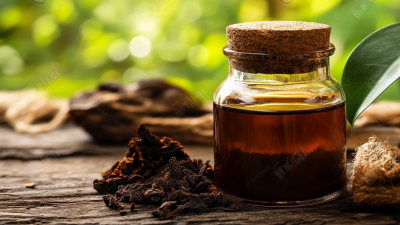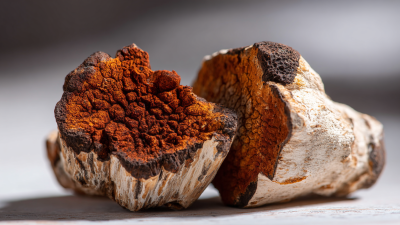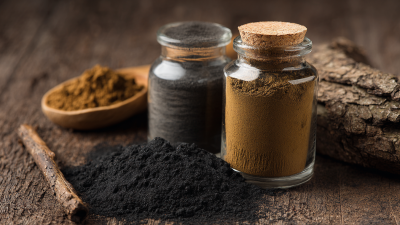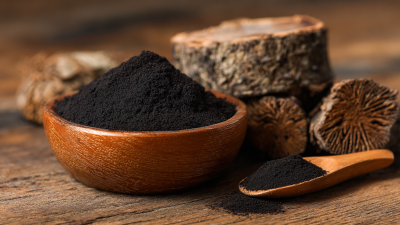In recent years, the demand for natural health supplements has surged, with the Chaga supplement emerging as a front-runner in the wellness community. According to a report by Grand View Research, the global dietary supplements market was valued at approximately $140.3 billion in 2020 and is expected to grow at a compound annual growth rate (CAGR) of 8.2% from 2021 to 2028. This trend highlights a growing consumer interest in the health benefits associated with traditional and herbal remedies, like Chaga, which is revered for its potent anti-inflammatory and antioxidant properties. As more individuals seek holistic approaches to health, understanding the best practices for selecting high-quality Chaga supplements becomes essential. This ultimate checklist aims to guide consumers through the myriad of options available, ensuring they make informed choices that align with their health goals.

Chaga, a type of medicinal mushroom, has been gaining significant attention for its remarkable health benefits. Originating from the cold regions of the Northern Hemisphere, Chaga has been used in traditional folk medicine for centuries. Rich in antioxidants, polysaccharides, and other bioactive compounds, this potent fungus is believed to enhance immune function, reduce inflammation, and combat oxidative stress. A study has indicated that the high content of betulinic acid in Chaga may contribute to its anti-cancer properties, making it a sought-after supplement in wellness circles.
The global mushroom market, including Chaga, is projected to witness substantial growth, with the market size increasing from $33.72 billion in 2025 to $62.18 billion by 2032, reflecting a compound annual growth rate (CAGR) of 9.14%. This trend underscores the rising consumer interest in natural and functional foods. As more people seek to incorporate the health benefits of Chaga into their diets, understanding its origins and the science behind its effects becomes crucial for making informed supplement choices. With a growing market and an increasing array of products available, ensuring the quality and efficacy of Chaga supplements is paramount for anyone looking to harness its health-promoting properties.

When choosing a Chaga supplement, it is essential to prioritize quality standards to ensure you’re getting the best health benefits from this powerful mushroom. Start by looking for products that have been third-party tested, as this guarantees that what’s on the label is actually in the bottle. Quality assurance not only verifies potency but also checks for contaminants, ensuring a safe consumption experience.
Additionally, consider the sourcing and processing methods used in the supplement. High-quality Chaga should be wild-harvested from pristine environments, as this enhances its bioactive compounds. Pay attention to extraction methods; hot water and alcohol extractions tend to yield the most effective results. As recent discussions among mycologists reveal, the health benefits of Chaga are best realized when the supplement adheres to these stringent quality practices. Recognizing these criteria will empower you to make an informed choice and fully harness the potential of Chaga for your health.
When selecting the right Chaga supplement for your health, it’s essential to understand the different forms available, which primarily include powders, capsules, and teas. Each type carries unique benefits and offers different ways of incorporating this nutrient-rich fungus into your daily routine. A report from the Journal of Medicinal Food highlights that Chaga is packed with antioxidants, boasting an oxygen radical absorbance capacity (ORAC) score of over 50,000, significantly higher than many other superfoods. This powerful antioxidant profile can aid in combating oxidative stress, offering potential health benefits.
Chaga powders are often favored for their versatility, allowing users to blend them into smoothies, soups, or herbal drinks, thereby enhancing daily nutrition easily. On the other hand, capsules provide a convenient option for those who prefer a pre-measured dosage without the taste. A study in the International Journal of Cancer found that consistent Chaga supplementation might support immune function and reduce inflammation. Teas, which can create a soothing ritual, encapsulate Chaga's medicinal properties and allow for a more traditional approach to using herbal supplements, making it popular among wellness communities. Understanding these options can empower you to make an informed choice tailored to your health needs.
When selecting the best Chaga supplement, evaluating branding and sourcing transparency is essential. Brands that prioritize transparency often provide detailed information about where their Chaga mushrooms are sourced. Chaga, typically found on birch trees in pristine environments, can vary significantly in quality depending on its origin. Look for companies that source their Chaga sustainably and ethically, sharing information about the specific regions and ecosystems they harvest from. This not only supports environmentally friendly practices but also ensures you receive a product rich in nutrients.
Moreover, branding can reveal a lot about a company's values and commitment to quality. Brands that are transparent about their extraction methods and production processes often indicate a higher level of trustworthiness. This includes sharing lab testing results for purity and potency, as well as certifications like organic and non-GMO. By choosing brands that openly communicate their practices, you engage with products that not only support your health but also align with ethical consumerism. Always remember, a brand’s dedication to transparency is a key factor in choosing a supplement that truly enhances your well-being.
When it comes to maximizing the health benefits of Chaga supplements, understanding the appropriate dosage is crucial. Generally, the recommended dosage can vary based on the form of Chaga—be it in powder, capsule, or liquid extract. For powdered Chaga, a dosage of 1 to 2 teaspoons per day is typically advised, often mixed into smoothies or teas. Capsules, on the other hand, usually provide a more concentrated approach, with a common recommendation of 1000 to 2000 mg daily. It’s essential to start with a lower dosage to assess your body’s response and gradually increase it as needed.

In addition to dosage, timing and consistency play significant roles in optimizing the benefits of Chaga. Taking Chaga supplements on an empty stomach might enhance absorption, while regular consumption can help maintain stable levels of beneficial compounds in your system. It’s also recommended to consult with a healthcare professional before starting any new supplement, particularly if you have pre-existing conditions or are taking medications. This ensures that you choose a Chaga supplement that aligns well with your individual health needs and lifestyle.






2025 Bio-Botanica, a division of Bio Answer Holdings Inc. All Rights Reserved.